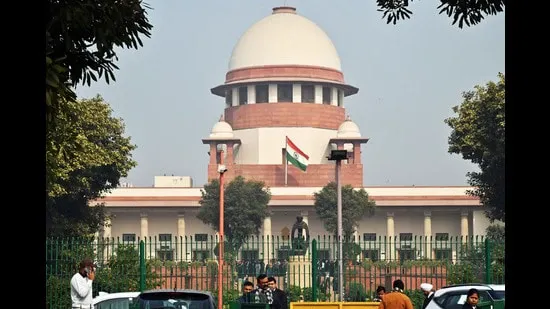India now ‘haven’ for foreigners overstaying illegally: Supreme Court
admin | October 7, 2025 7:21 AM CST

The Supreme Court on Monday said India seemed to have become a "haven" for foreigners who overstay illegally, as it came down strongly on an Israeli man living in Goa with a Russian partner while dismissing his plea seeking to stop their two minor daughters from being sent back to Russia.
A bench of justices Surya Kant and Joymalya Bagchi refused to entertain the petition filed by Dror Shlomo Goldstein, who claimed to be the father of the two girls, calling it a "publicity interest" and "frivolous" litigation.
"This country has become a haven for all kinds of people. Anybody comes and stays here endlessly," the bench remarked during the hearing, questioning how the Israeli national was sustaining himself in India.
"Why are you in India despite being Israeli? What is your source of livelihood? We do not want to comment on your activities but how are you surviving in Goa?" the court asked, as Goldstein's lawyer, Deepak Prakash, sought an adjournment to confirm whether the children had already been repatriated, and to also serve a copy of the petition to the Centre.
The bench, however, declined to keep the matter pending. "We find this special leave petition totally frivolous. Apparently, the petitioner approached the high court and this court only for publicity," the initial order read. The court later allowed Goldstein to withdraw the plea, dismissing it as withdrawn.
During the hearing, the bench also pulled up Goldstein, asking for any proof or evidence to show that he was the father of the girls. "If you are the father, what were you doing when your children were living in a cave? Why should we not order your deportation too?"
The case traces back to July this year, when Nina Kutina, a 40-year-old Russian woman, and her two young daughters, aged six and five, were rescued from a forest cave in Karnataka by local police. The trio had been living there for weeks, reportedly without valid travel or residence documents.
Kutina and her daughters were later sent to a foreigners' detention centre, and the Karnataka high court directed the Union government to issue travel documents for their repatriation. They were flown back to Russia on September 28, along with Kutina's minor son from another relationship who was found in Goa.
Goldstein, who described himself as an Israeli businessman residing in Goa, had petitioned the high court to stop the deportation and sought custody of the two girls, claiming he had been providing for their welfare. The court, however, dismissed his plea, observing that despite his claims, the woman and her daughters were "inexplicably found living in an isolated cave," and that Goldstein could not offer a convincing explanation for the circumstances.
'Lakhs are overstaying'
In a separate matter heard on Monday, the Supreme Court bench expressed similar disquiet while considering a plea by a Sudanese national, Yousif Haroun Yagoub Mohamed, who sought protection from coercive action against himself and his family for allegedly overstaying in India.
Senior advocate S Muralidhar, appearing for Mohamed, told the court that his client possessed a refugee card issued by the United Nations High Commissioner for Refugees (UNHCR) and had applied for asylum in Australia. He also expressed concern about an ongoing drive against overstaying foreigners.
The bench, however, noted that India does not recognise UNHCR refugee cards, as the country is not a signatory to the 1951 UN Refugee Convention or its 1967 Protocol.
"You know the MHA (ministry of home affairs) does not acknowledge the refugee card...They have opened a showroom here and are issuing cards there," the court observed. "Why don't you move to Australia? You have already applied for asylum there," it told the petitioner.
The bench cautioned that the court needed to be "very careful" while entertaining such petitions. "Lakhs and lakhs are sitting here, overstaying," the bench said.
The court ultimately disposed of the plea, noting that the petitioner had already approached the National Human Rights Commission (NHRC).
The remarks come amid growing scrutiny of illegal foreign nationals staying in India, particularly in states such as Goa, Karnataka, and Delhi, where overstaying tourists and self-proclaimed asylum seekers have periodically drawn police attention.
India does not have a domestic refugee law and handles asylum or overstay cases through a mix of administrative measures under the Foreigners Act, 1946 and the Passport (Entry into India) Rules, 1950. In recent months, authorities have intensified enforcement against long-term overstayers and foreigners involved in unauthorised activities.
The MHA had on May 2 issued a notification authorising a nationwide drive to identify and deport illegal immigrants. The notification is currently under challenge before the same bench in the top court, which had in August asked the Union government to explain the standard operating procedure (SOP) being followed, while stressing that the Centre ought to dispel allegations that members of the Bengali-speaking minority community were being singled out.
READ NEXT
-
Drinking figs of figs will give 5 shocking health benefits

-
Diwali 2025 DIY: How to make hanging paper lantern for festive decor

-
What happens is Diathylene Glycol Poisonous Chemical, Why is there death due to mixing in Kapha Sirf

-
Know the importance of fasting and worship method

-
Thylane Blondeau steps out at Paris Fashion Week
